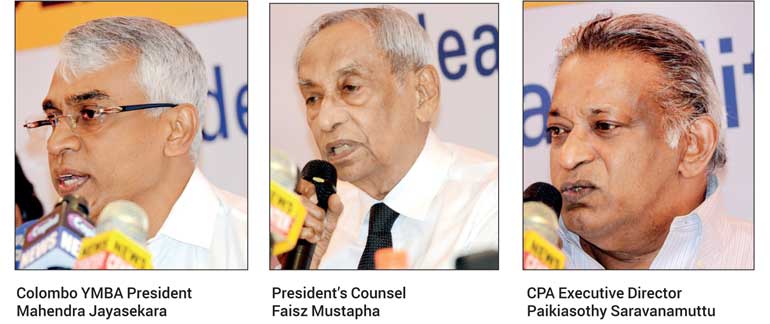Thursday Feb 19, 2026
Thursday Feb 19, 2026
Wednesday, 16 October 2024 00:00 - - {{hitsCtrl.values.hits}}

By Janani Kandaramage
The Sri Lankan Civil Collective last week issued a clarion call to voters to “choose someone who can do you justice” at next month’s Parliamentary election.
The Collective, which consists of 45 organisations and civil society leaders such as the Colombo Young Men’s Buddhist Association, People’s Action for Free and Fair Elections (PAFFREL), the Centre for Policy Alternatives, and President’s Counsel Faisz Mustapha, has come up with 10 criteria to assess when voting for next set of MPs.
As concerned citizens of this country, a group of well-meaning individuals and prominent civil organisations, now known as ‘Civil Collective’, came together and embarked on a mission in 2022 to educate the voter on how to select the ‘ideal candidate’ for themselves.
It is noteworthy that these 10 criteria were vetted by many, including civil organisations, faith groups, political parties, prominent business personalities, and professionals, since it began this journey. The Collective was equally surprised andpleased to have their strongest approval and blessings for the cause.
The members of Civil Collective, who have their representatives around the country, will be echoing the call for better selection of candidates and educating the masses on how to choose candidates when voting. This is to ensure we have members of elected office who we can trust, based on their track record, and depend on, based on their proven skills and competencies, to make better decisionsfor the future.
This roll-out will also be carried out on social media and the public are invited tohelp make this voice/initiative heard so that their yearning call and wish for abetter calibre of representatives becomes a reality.
The Collective is mindful of the challenging task ahead and invites all to make a concerted and relentless call for change so that, not only those in Sri Lanka, but Sri Lankans living in other parts of the world also hear the message. Representatives from Civil Collective will also be holding meetings throughout the island to create awareness amongst the local population and are inviting all like-minded individuals to join them in this national cause.
Speaking about the need for such an assessment, Colombo YMBA President Mahendra Jayasekara said: “For decades, Sri Lankan voters have elected politicians and governments based on loyalty to a certain party. Others have voted in the hope of personal gains in the form of influence based on promises made by politicians during campaigns. Voters need to think practically by focusing on the tangible reality instead of being swayed by utopian promises.”
All these choices, made for self-motivated reasons, culminated in a state of bankruptcy and widespread corruption, plunging 2.5 million people below the poverty line and mass immigration.
President’s Counsel Mustapha emphasised that the “Aragalaya told us we had to change,” awakening people to the harsh abyss surrounding them, driving many to demand a structural change within the system. However, a systemic change will only remain a dream unless honourable and selfless people’s representatives get elected to Parliament and public office.
The criteria to assess each candidate for the Parliamentary elections 2024 are as follows:
nEducation and qualifications: Should be intellectually prepared to handle complexities of governance.
nState of physical and mental health: It is crucial that candidates are psychologically resilient as well, adapting to shifting dynamics and economic downturns while being able to make strategic decisions under pressure.
nAllegations of corruption: Candidates must be free of any prima facie cases of corruption and scandal.
nCriminal record: Candidates should be free of any prima facie cases and criminal allegations.
nIntegrity and ethical standards: Given the concerns revolving around political corruption, an ideal candidate is expected to maintain honesty in his/her dealings. The candidate must be committed to being accountable to their constituents and adhering to democratic principles, ensuring their actions align with public welfare.
nWillingness to declare assets and liabilities: Should be able to account for personal wealth, ensuring that tax money is not exploited.
nPerformance record: Candidates must demonstrate good leadership in public services, community work, or through prior political experience. A good record performance in his/her field will inspire public trust and provide a sense of direction.
nCommunity mindedness: Genuine dedication and sincerity towards uplifting society.
nNon-racial: A candidate must not espouse communal tensions by catering to the needs of specific ethnicities and must instead be sensitive to these differences, promoting unity and peace.
nPlan for the area: An ideal candidate must fundamentally have a clear, realistic vision and policy agenda for their region.
Although concerns were raised over the practicality of one candidate embodying all these 10 characteristics, CPA Executive Director Paikiasothy Saravanamuttu justified: “This is criteria constructed to guide voters in choosing their preferences. They are not principles that must be embodied,” he said.
Responding to queries around voter illiteracy, Saravanamuttu assured that campaigns will be conducted across the country to guide individuals into making better informed decisions.
“Democracy represents people, and people are never morally neutral. Irrespective of their knowledge in current affairs, they vote by their principles and vision for society. Hence, it is our duty to raise awareness of this criteria and the parties they are surrounded by. That way, they will be able to vote for the party and candidate that can do justice to their beliefs. Ultimately, democracy is by the people, and for the people.”